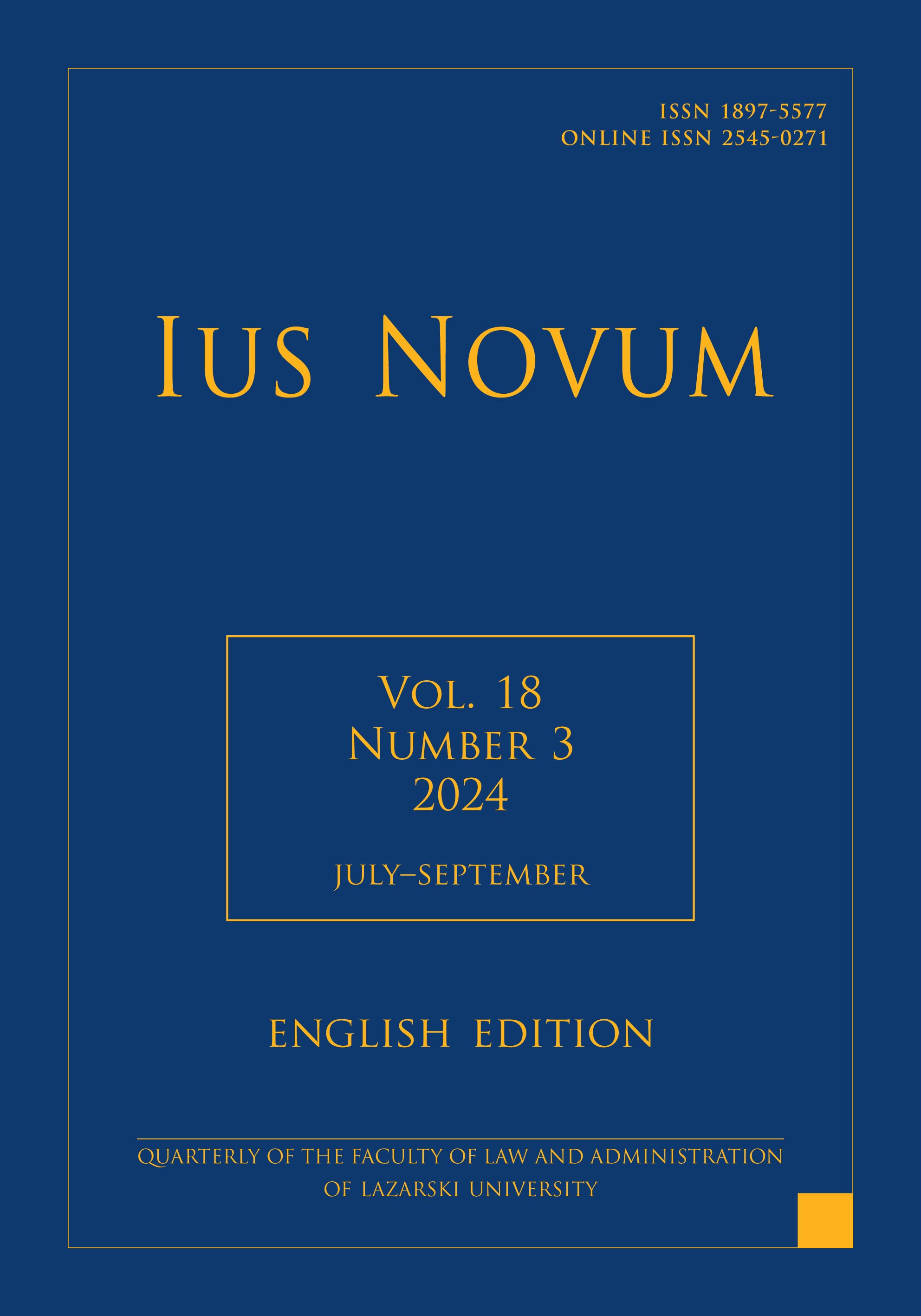Abstrakt
Article 1 of Protocol No. 1 to the Convention for the Protection of Human Rights and Fundamental Freedoms provides that every natural and legal person is entitled to the peaceful enjoyment of their possessions. No one shall be deprived of their possessions except in the public interest and subject to the conditions provided by law and the general principles of international law. The primary purpose of these provisions is to protect property. By recognising that everyone has the right to the peaceful enjoyment of their possessions, Article 1 of Protocol No. 1 to the Convention for the Protection of Human Rights and Fundamental Freedoms effectively guarantees the right to property, with deprivation of property permissible only under certain conditions. These guarantees are not sufficiently implemented in national case law. Although municipalities are required to provide compensation (Article 18(3a) of the Act on the Protection of Tenants’ Rights, Housing Resources of Municipalities and on Amendments to the Civil Code), the courts are too stringent in assessing the evidentiary requirements imposed on applicants. In the case of Wyszyński v. Poland, where the applicant was not awarded damages from the municipality for failing to provide social housing, the Court rightly noted that the domestic courts assumed that the applicant had failed to prove that the damage sustained was a normal consequence of the municipality’s unlawful inactivity, even though two expert opinions were produced during the proceedings. In the case of Broniowski v. Poland, concerning property beyond the Bug River, it was clearly indicated that the taking of property without compensation in reasonable proportion to its value is generally considered disproportionate interference, and a total absence of compensation can only be justified in exceptional circumstances. It also appears essential, when assessing the existence of an adequate causal link, to rely on the knowledge and life experience of the adjudicating panel, applied appropriately to the circumstances of the case. The requirements as to the proof of damage should not be interpreted too strictly. There is a need to liberalise evidentiary proceedings and make broader use of factual presumptions (Article 231 of the Code of Civil Procedure), as well as to limit the evidence required for substantiation, to ensure that the owner can effectively seek compensation from the municipality for failure to provide social housing. Clear legislative intervention is necessary to address the defective court practices. It would be advisable to make an explicit procedural reference to the application of Article 322 of the Code of Civil Procedure in this category of cases, not only regarding the amount of damage but also concerning the fact that it occurred.
Bibliografia
Banaszczyk, Z., in: Pietrzykowski, K. (ed.), Kodeks cywilny. Tom I. Komentarz do art. 1–44910, Warszawa, 2011.
Czachórski, W., Prawo zobowiązań w zarysie, Warszawa, 1968.
Czachórski, W., ‘Ustalenie wysokości odszkodowania według przepisów kodeksu zobowiązań’, Nowe Prawo, 1958, No. 4 and No. 5.
Czachórski, W., Zobowiązania. Zarys wykładu, Warszawa, 1974.
Dąbrowa, J., ‘Odpowiednie ograniczenie rozmiarów obowiązku naprawienia szkody na tle kodeksu cywilnego’, Państwo i Prawo, 1968, No. 1.
Duży, A., ‘Dyferencyjna metoda ustalania wysokości szkody’, Państwo i Prawo, 1993, No. 10.
Dybowski, T., in: Radwański, Z. (ed.), System prawa cywilnego. Tom III. Część 1. Prawo zobowiązań – część ogólna, Wrocław–Warszawa, 1981.
Dziczek, R., ‘Komentarz do ustawy o ochronie praw lokatorów, mieszkaniowym zasobie gminy i zmianie Kodeksu cywilnego’, in: Dziczek, R., Ochrona praw lokatorów. Dodatki mieszkaniowe. Komentarz. Wzory pozwów, LEX 2020.
Fuchs, B., ‘Komentarz do art. 361 k.c.’, in: Fras, M., Habdas, M. (eds), Kodeks cywilny. Komentarz. Tom III. Zobowiązania. Część ogólna (art. 353–534), Warszawa, 2018.
Garlicki, L., Hofmański, P., Wróbel, A., Konwencja o Ochronie Praw Człowieka i Podstawowych Wolności. Tom 1. Komentarz do artykułów 1–18, Warszawa, 2010.
Jastrzębski, J., ‘Dyferencyjna metoda ustalania szkody w sprawach reprywatyzacyjnych – krytyczne uwagi na tle orzecznictwa Sądu Najwyższego’, Przegląd Sądowy, 2016, No. 3.
Kaliński, M., in: Olejniczak, A. (ed.), System Prawa Prywatnego. Tom 6. Prawo zobowiązań – część ogólna, Warszawa, 2009.
Kaliński, M., Szkoda na mieniu i jej naprawienie, Warszawa, 2014.
Koch, A., Metodologiczne zagadnienia związku przyczynowego w prawie cywilnym, Poznań, 1975.
Koch, A., Związek przyczynowy jako podstawa odpowiedzialności odszkodowawczej w prawie cywilnym, Warszawa, 1975.
Krzekotowska, K., Malinowska-Wójcik, M., Ochrona praw lokatorów i mieszkaniowy zasób gminy. Komentarz, 2nd ed., Lex 2021, commentary to Article 18.
Łazarska, A., Rzetelny proces cywilny, Warszawa, 2012.
Nesterowicz, M, in: Nowicka, A. (ed.), Prawo prywatne czasu przemian. Księga pamiątkowa dedykowana Profesorowi Stanisławowi Sołtysińskiemu, Poznań, 2005.
Nowicki, M.A., ‘Broniowski przeciwko Polsce – wyrok ETPC z dnia 22 czerwca 2004 r., skarga nr 31443/96’, in: Nowicki, M.A., Nowy Europejski Trybunał Praw Człowieka. Wybór orzeczeń 1999–2004, Zakamycze, 2005.
Nowicki, M.A., ‘Komentarz do art. 1 Protokołu nr 1 do Konwencji o ochronie praw człowieka i podstawowych wolności’, in: Wokół Konwencji Europejskiej, Komentarz do Europejskiej Konwencji Praw Człowieka, 8th ed., 2021, Lex el.
Ohanowicz, A., Zobowiązania. Zarys według kodeksu cywilnego. Część ogólna, Warszawa–Poznań, 1965.
Olejniczak, A., Kidyba, A. (eds), Kodeks cywilny. Komentarz. Tom III. Zobowiązania – część ogólna. Komentarz do art. 361, 2nd ed., LEX 2014.
Radwański, Z., Olejniczak, A., Zobowiązania – część ogólna, Warszawa, 2012.
Szpunar, A., ‘Rozważania nad odszkodowaniem i karą’, Państwo i Prawo, 1974, No. 6.
Szpunar, A., ‘Ustalenie odszkodowania według przepisów kodeksu cywilnego’, Nowe Prawo, 1965, No. 4.
Szpunar, A., Ustalenie odszkodowania w prawie cywilnym, Warszawa, 1973.
Szpunar, A, ‘Zakres obowiązku naprawienia szkody’, Państwo i Prawo, 1960, No. 1.
Tuora-Schwierskot, E., ‘Prawo własności w prawie wspólnotowym a regulacje prawa krajowego’, in: Stępień-Załucka, B. (ed.), Konstytucyjne prawo własności – sposoby naruszenia i środki ochrony, Warszawa, 2021.
Vollkommer, M., ‘Einleitung’, in: Zöller. Kommentar zur Zivilproezessordnung, 29th ed., Köln, 2010.
Winiarz, J., Ustalenie wysokości odszkodowania, Warszawa, 1962.

Utwór dostępny jest na licencji Creative Commons Uznanie autorstwa – Użycie niekomercyjne – Na tych samych warunkach 4.0 Międzynarodowe.
Prawa autorskie (c) 2024 Lazarski University, Warsaw, Poland

